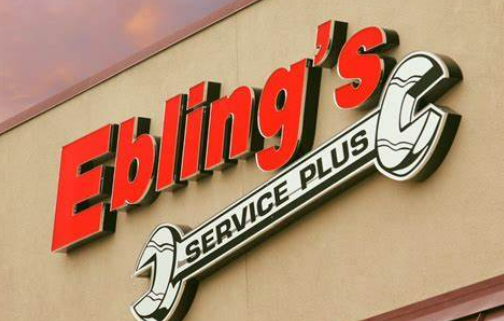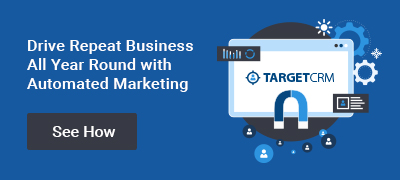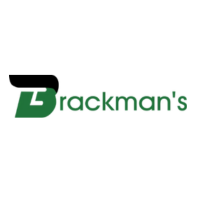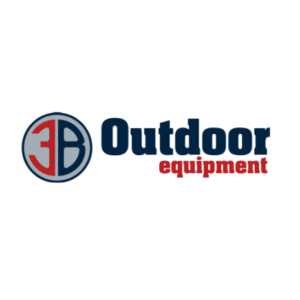Learn what’s best for your dealership.
How Ebling’s Service Plus Use Text Messaging to Go Above and Beyond for Customers
When your service department has technicians hunting down models and serial numbers, walking back and forth to the parts room, and juggling multiple work orders, it’s easy for customer communication to fall through the cracks.
But at Ebling’s Service Plus, there’s no such thing as over-communicating with customers. The dealership’s emphasis on customer communication goes as far back as 1943 when David Ebling founded the power equipment business. Today, the dealership is in Myerstown, Pennsylvania where they’ve remained true to their foundational values, but with a modern twist: text messaging.
According to Darvin Martin, Service Manager at Ebling’s, text messaging has streamlined their service department’s communication, allowing them to meet and exceed the expectations of today’s customers. TargetCRM’s two-way text messaging feature has not only saved their service department time, but also created a direct line to the service department for customer inquiries.
Ebling’s recipe for success: communicating upfront with customers.
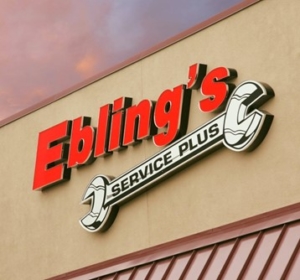 Darvin: “I think one of the things that sets us apart would be the people that we have working for us. We do business the way we want to be treated. And that’s something that’s very important to us. We’re not perfect, but we absolutely do whatever it takes to keep the customer happy. We want to be their friend. Ultimately, that’s what it comes down to – it’s all about relationships.
Darvin: “I think one of the things that sets us apart would be the people that we have working for us. We do business the way we want to be treated. And that’s something that’s very important to us. We’re not perfect, but we absolutely do whatever it takes to keep the customer happy. We want to be their friend. Ultimately, that’s what it comes down to – it’s all about relationships.
For me right now, my day consists of a lot of customer communication. So, I am the one that is responsible for any estimate. For example, we don’t like to do a lot of work before we call the customer because it’s not our money to spend. People want to know where they’re spending their money and why it’s needed. We feel that we can actually be more profitable if we’re communicating upfront or before the repair, rather than when they’re hit with this large repair bill.”
Maintaining great customer relationships in this day and age means your communication tools need to be cutting edge.
Darvin: “It seems that the shift in the last number of years has been that people can’t necessarily pick up their phone and talk as easily as maybe you would’ve in the past. And it seems a lot of people will just as easily respond to a text message, especially for the simple, simple notifications, like, hey, your machine’s finished. Or if it’s a simple estimate where you had it in here for service, but it needs a belt. Is it alright if we spend a hundred bucks more than what we had anticipated spending when you dropped it off? That kind of stuff.
The more complicated estimates that require a little bit more explanation, if I can’t get a hold of them right away on a quick phone call, I will send them a text or leave a message. A text message is an easy way to say, hey, reach me at your earliest convenience. And they can look at it on their phone and then chalk it up for a conversation later.
As far as what led us into TargetCRM, we were already using texting before Target ever came out. And then when Target first came out, we jumped on board with that. We want to be cutting edge and it’s an easier interface to use.”
The versatility of text messaging:
Darvin: “At this point, the texting features are what we use primarily in TargetCRM and the surveys are another one that we use. For the two-way texting, we have templates set up that automatically fill in the customers’ names. All we have to do is maybe change one or two words in the conversation or in that little message and hit send. Now it’s like a simple, hey, your machine’s finished. You can come get it anytime. So, it takes us 10 seconds or 15 seconds. It’s definitely a time-saver for quick notifications.
We use it for informative messages as well to say, hey, we didn’t get your machine wrapped up as quickly as we thought, we had to order a part, we have plans to expand on that, but we’re not fully there. It’s not necessarily Target holding us back, it’s our own processes. So that is definitely very, very handy to have at our fingertips, just for the same quick messages.
Our pickup and delivery driver also utilizes the app quite a bit because he’s out on the road. If he gets a message from a customer saying, that’s okay to pick up my mower, he might have sent it before he left, but he didn’t have time to wait around. So, he left and half an hour later, he gets the message that he can swing by and pick it up.”
Do Ebling’s customers prefer text messages over phone calls?
Darvin: “There’s a handful of customers who’ve raved about it. They just love this two-way texting back and forth. I have a couple commercial customers who are busy in the crew, they’re out mowing or whatever, and they won’t be able to answer a phone call. But if they can see a quick text message, that’s very useful for them. They say they actually prefer that over a phone call because it allows them to get back to us at their convenience instead of listening to a voicemail or not hearing the phone ring.”
How text messaging has allowed Ebling’s to effectively overcome its previous challenges with customer communications.
Darvin: “The challenge of just time spent on the phone is number one. Number two, it allows me to send pictures to customers when you’re trying to explain something to somebody, or they have a picture of a broken part, and they can’t explain it to us. So, it’s like, I don’t know what you’re talking about, sir, but can you just snap a picture of it and send it to our service hotline?
We have a unique phone number for each department. For example, parts, sales, and service each have their own phone number. We just like to do that so it keeps everything separated. And then we also have our phone system set up to accept calls to that number, and it will automatically forward to the service department’s queue.
So, it’s dual purpose. Our phone numbers are not just for texting. They’re also to reach that specific department more quickly. We’re trying to get our customers trained to use this hotline number because it’ll get you right to the department that called you back or that was contacting you in the first place. So that’s kind of how we have it set up. And it’s just nice not to have to use my personal cell phone for messages. It is very, very nice that way.”
Darvin’s long-term goals for Ebling’s service department:
Darvin: “Well, one of the things is communication improvement. You can hardly over-communicate when it comes to service. The more we can communicate with our customers about the status of their machine, the more different things like that would be.
If we can start the communication – instead of them calling us – if we can reach out to them before and say, I know you were expecting this thing back within several days, but it’s going to go a little longer because we had to order a part. That’s the kind of thing we’d like to do. We run through close to 9,000 work orders in one year, at one location, so we need integrations, and we need the tools and I think Target has the potential to do that for us.”
What would you say to somebody who’s on the fence about getting two-way texting at their dealership?
Darvin: “Text messaging is universal. It doesn’t matter what phone you have. Doesn’t matter what service you’re using; text messaging is the universal communication tool for short messaging. I would say if you want to be cutting edge and you want to reach the new generation of customers or clients, stay with it. If you’re not going to stay with what is current, you’re going to fall behind. I think this is one way to stay the best.”
Want to get started with TargetCRM and connect directly with your customers through texts? Click below to find out how!
